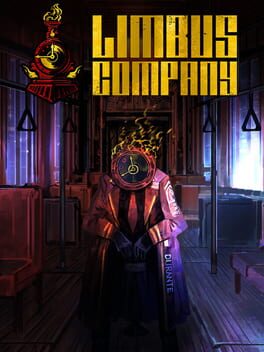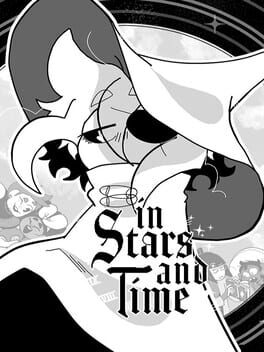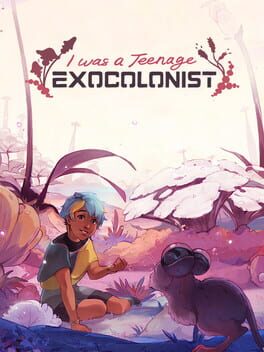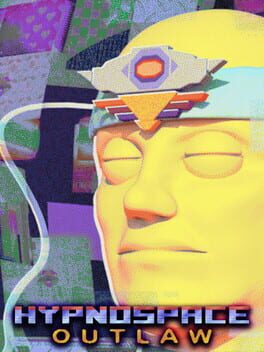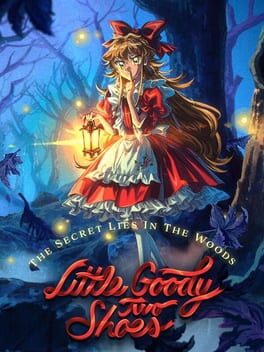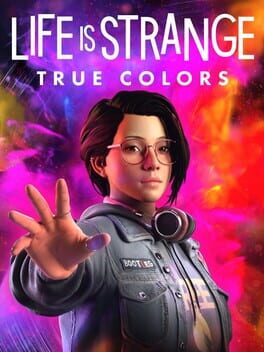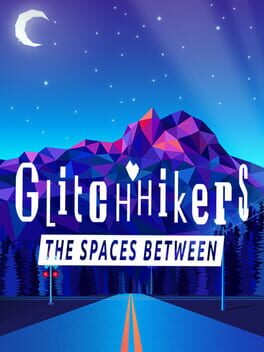sirconnie
2023
I'm obsessed with this game. It's a brainrot that consumes me every waking hour. I binged the finale to Canto VI for 5 hours straight and was hooked the entire time. I've been working through reading the literary inspirations for all the Sinners, and what Project Moon have built off the back of Wuthering Heights is incredible. More than anything, the character writing is so movingly human despite the horrors and depravity of the City. Nobody's ever too "broken" to be worth love.
Love must be the reason why
I still believe in this lie
That you'll live a better life
Without me by your side
Love must be the reason why
I still believe in this lie
That you'll live a better life
Without me by your side
2023
(This is a rewrite of my first ever review on Backloggd! For posterity’s sake I’ll leave up that review here, but I don’t love it and I’m writing this review as an improvement on what I wanted to say back then.)
━━━━━━━━━
Before I played In Stars and Time in November of 2023, I played the proof-of-concept version, START AGAIN: a prologue a whole year and a half earlier, in April of 2022. I usually don’t play demos, especially not paid demos, but I’d been following this project based on the art style and I felt like it was something special. I liked the prologue well enough. It was charming and I was drawn to the characters. The prologue starts in medias res as the party prepare to defeat the “final boss”, the King, at the end of their JRPG journey. The catch is that the protagonist, Siffrin, is stuck in a time loop and nobody else in the party is aware. Despite this, Siffrin resolves to carry this burden alone, and to use this ability to defeat the King without worrying his allies.
My one big issue with this demo was that, although I liked him as a character, Siffrin’s decision to bottle up his feelings and keep the time loop a secret made no sense to me. It seemed contrived that he wouldn’t, even once, experiment with the time loop and tell his allies about what was going on. If it caused any issues, it wouldn’t matter – he could just loop back and START AGAIN. After the demo, I was a little disappointed but still hopeful the full release could turn my opinion around.
As the full release approached, I grew really excited. I’d been following the dev’s monthly dev logs on Steam up to release, and I bought the full game in the first week after it came out, a rare event for me. I finished it in 6 days, binging it between study sessions for my upcoming exams. I was hooked, and by the end of the game, In Stars and Time had fully recontextualized the demo.
Siffrin didn’t tell his party about the time loop because he loves them. He didn’t tell them because he refuses to be vulnerable.
When I played the demo I saw these characters from my omniscient point of view as the player, as little pawns to command in whatever way would progress the plot. Siffrin’s refusal to open up felt like an arbitrary obstacle put in place by the creator as if to say “but then we wouldn’t have a plot, would we?” But Siffrin isn’t the player, and he isn’t aware he exists in a video game. To him, the rest of the party aren’t pawns; they’re his allies. His friends. His family.
What’s more, Siffrin is incredibly repressed. He’s reserved, happy to nod along in the background because he believes that placing himself as the centre of attention will lead everyone to hate him as much as he hates himself. He sees himself as inherently less valuable than others, and takes the time loop to be his chance to martyr himself in service of his family.
I’m reminded of Jacob Geller’s video Time Loop Nihlism, wherein he talks about Deathloop and the way replaying a game desensitizes us. The more we play, the more we’re able to abstract NPCs from living, breathing people into gameplay systems. Our immersion fades with each repeat as cause and effect become predictable. This was the mindset I had playing the demo.
In Stars and Time actively subverts this idea. Siffrin refuses to allow nihilism to overtake him. Sure, if anything happened to a family member, he could reset the timeline and fix it. But in that moment, in that present moment, his family would suffer, and that suffering would be real. For the same reason we wouldn’t kill a person even though they’ll die sometime in the future anyways, Siffrin won’t let his family come to harm even though he can reset the harm they suffer. The time loop is his burden and his alone, and he will do everything in his power to allow his family to be happy for as long as he can.
In Stars and Time is repetitive. You will repeat the same dungeon over and over for the game’s entire runtime. You will fight the same enemies over and over. The same bosses. Siffrin’s family will repeat the same dialogue again and again. You will find the same items scattered throughout the dungeon. You will walk between the same rooms in the same layout looking for the same keys to progress. There are plenty of quality-of-life features to reduce frustration; you can loop to specific areas in the dungeon after dying, you can skip seen dialogue, and Siffrin retains levels between every loop while his family retain their levels at checkpoints within the dungeon. But, no matter what, you will repeat the same events over and over. You will be sent back and forth, and at several points you will progress to a certain point in the dungeon only to realize you had to do something in a now blocked-off area, forcing another reset. The ludonarrative is excellent and encourages the player to experience Siffrin’s frustrations alongside him.
This is why Siffrin’s character arc is so compelling. The whole game, he does his best to protect, long past the point the player has. Every so often he’ll make a major breakthrough, and his enthusiasm is extreme. This is it! He’s figured it out! That enthusiasm soon fades as his plans inevitably lead to more and more dead ends. Even Siffrin has his breaking point, and his growing disillusionment with the repetition, the monotony, makes him a fascinating tragic protagonist. I won’t say much because of spoilers, but the toll the time loop takes on his mental health, compounded with his poor self-esteem and inability to show vulnerability, make Siffrin an amazing and relatable protagonist.
I could praise everything about this game if I wanted to, but I chose to focus on Siffrin because his characterization is central to what makes In Stars and Time so engaging. I love its characters, its world-building, its music, its everything. Please, if what I’ve written above is at all interesting and you can stomach the repetition, you owe it to yourself to play In Stars and Time.
━━━━━━━━━
Before I played In Stars and Time in November of 2023, I played the proof-of-concept version, START AGAIN: a prologue a whole year and a half earlier, in April of 2022. I usually don’t play demos, especially not paid demos, but I’d been following this project based on the art style and I felt like it was something special. I liked the prologue well enough. It was charming and I was drawn to the characters. The prologue starts in medias res as the party prepare to defeat the “final boss”, the King, at the end of their JRPG journey. The catch is that the protagonist, Siffrin, is stuck in a time loop and nobody else in the party is aware. Despite this, Siffrin resolves to carry this burden alone, and to use this ability to defeat the King without worrying his allies.
My one big issue with this demo was that, although I liked him as a character, Siffrin’s decision to bottle up his feelings and keep the time loop a secret made no sense to me. It seemed contrived that he wouldn’t, even once, experiment with the time loop and tell his allies about what was going on. If it caused any issues, it wouldn’t matter – he could just loop back and START AGAIN. After the demo, I was a little disappointed but still hopeful the full release could turn my opinion around.
As the full release approached, I grew really excited. I’d been following the dev’s monthly dev logs on Steam up to release, and I bought the full game in the first week after it came out, a rare event for me. I finished it in 6 days, binging it between study sessions for my upcoming exams. I was hooked, and by the end of the game, In Stars and Time had fully recontextualized the demo.
Siffrin didn’t tell his party about the time loop because he loves them. He didn’t tell them because he refuses to be vulnerable.
When I played the demo I saw these characters from my omniscient point of view as the player, as little pawns to command in whatever way would progress the plot. Siffrin’s refusal to open up felt like an arbitrary obstacle put in place by the creator as if to say “but then we wouldn’t have a plot, would we?” But Siffrin isn’t the player, and he isn’t aware he exists in a video game. To him, the rest of the party aren’t pawns; they’re his allies. His friends. His family.
What’s more, Siffrin is incredibly repressed. He’s reserved, happy to nod along in the background because he believes that placing himself as the centre of attention will lead everyone to hate him as much as he hates himself. He sees himself as inherently less valuable than others, and takes the time loop to be his chance to martyr himself in service of his family.
I’m reminded of Jacob Geller’s video Time Loop Nihlism, wherein he talks about Deathloop and the way replaying a game desensitizes us. The more we play, the more we’re able to abstract NPCs from living, breathing people into gameplay systems. Our immersion fades with each repeat as cause and effect become predictable. This was the mindset I had playing the demo.
In Stars and Time actively subverts this idea. Siffrin refuses to allow nihilism to overtake him. Sure, if anything happened to a family member, he could reset the timeline and fix it. But in that moment, in that present moment, his family would suffer, and that suffering would be real. For the same reason we wouldn’t kill a person even though they’ll die sometime in the future anyways, Siffrin won’t let his family come to harm even though he can reset the harm they suffer. The time loop is his burden and his alone, and he will do everything in his power to allow his family to be happy for as long as he can.
In Stars and Time is repetitive. You will repeat the same dungeon over and over for the game’s entire runtime. You will fight the same enemies over and over. The same bosses. Siffrin’s family will repeat the same dialogue again and again. You will find the same items scattered throughout the dungeon. You will walk between the same rooms in the same layout looking for the same keys to progress. There are plenty of quality-of-life features to reduce frustration; you can loop to specific areas in the dungeon after dying, you can skip seen dialogue, and Siffrin retains levels between every loop while his family retain their levels at checkpoints within the dungeon. But, no matter what, you will repeat the same events over and over. You will be sent back and forth, and at several points you will progress to a certain point in the dungeon only to realize you had to do something in a now blocked-off area, forcing another reset. The ludonarrative is excellent and encourages the player to experience Siffrin’s frustrations alongside him.
This is why Siffrin’s character arc is so compelling. The whole game, he does his best to protect, long past the point the player has. Every so often he’ll make a major breakthrough, and his enthusiasm is extreme. This is it! He’s figured it out! That enthusiasm soon fades as his plans inevitably lead to more and more dead ends. Even Siffrin has his breaking point, and his growing disillusionment with the repetition, the monotony, makes him a fascinating tragic protagonist. I won’t say much because of spoilers, but the toll the time loop takes on his mental health, compounded with his poor self-esteem and inability to show vulnerability, make Siffrin an amazing and relatable protagonist.
I could praise everything about this game if I wanted to, but I chose to focus on Siffrin because his characterization is central to what makes In Stars and Time so engaging. I love its characters, its world-building, its music, its everything. Please, if what I’ve written above is at all interesting and you can stomach the repetition, you owe it to yourself to play In Stars and Time.
I’m a big proponent of the idea that “limitations breed creativity.” That’s part of the reason I love indie games so much! Gorgeous photorealistic graphics and hundreds of hours of gameplay are all well and good, but with a low budget comes a willingness to experiment, to be rough around the edges in a way that connects with its target audience with a specificity that something with a bigger budget could never manage. That ambition is what I see most in I Was a Teenage Exocolonist.
IWATE is, first and foremost, a coming-of-age story. Mechanically and thematically I’d liken this game to Citizen Sleeper, but unlike that game which takes place over a couple months, IWATE is set over the course of 10 years. Your protagonist, Sol, is only 10 years old when their spaceship, the Stratos, arrives on the alien planet Vertumna. In this new and dangerous world, Sol navigates their teen years alongside the foundation of their colony.
The breadth of IWATE’s themes is astounding. The inter- and intrapersonal journeys had while growing up juxtapose the material conditions of the colony and their settlement in new territory, with environmentalism and colonization being the primary ethical issues explored. As a teenager, when can we trust authority? As a civilian, when can we trust those in charge? What do we do when those stupid, no-good, bossy adults are the ones waging war? What about when community leaders neglect the needs of the next generation they’re meant to foster? Being a teenager is hard, but try going through puberty and adolescence in the uncharted alien wilderness. Through these topics and more, IWATE masterfully weaves together sci-fi and coming-of-age into something greater than the sum of its parts.
\\ (The following section has minor spoilers.)
During your first playthrough, you eventually learn that Sol is in a time loop. This is, in part, a diegetic justification for New Game+; it’s not like, say, Undertale, where the true story can only be unearthed through repeat playthroughs. If you’re satisfied, you can put down IWATE after your first playthrough. But you’d be missing out on a lot.
For Sol, this time loop is a blessing, not a curse. IWATE holds a great love and empathy for humanity and our potential. You can’t do everything in a single playthrough. There’s no “Golden” end, where you max out every stat, befriend everyone, and lead everyone to a perfect tomorrow. Instead, you’re encouraged to construct the lives Sol could lead, the different people they could grow up to be. Each life is equally as valid as the next. What role will you play for your community?
\\ (Spoilers end here.)
Of course, it’s only natural that IWATE falls into some pitfalls with its limitations. The more choices there are for a player to make, the more choices there are that need to be accounted for. I wish there were more ways for characters to die, I wish there were more unique endings instead of career endings, I wish romance didn’t fade into the background after you’ve gotten into a relationship. I wish the team had more resources to really flesh out everything I’ve mentioned and more. But if they had had those resources from the start, would I Was a Teenage Exocolonist exist? Limitation breeds creativity, after all.
I’ve played through IWATE twice, and I plan to play it many more times in the future. It’s ambitious and its breadth of scope is breathtaking. I haven’t discovered everything and I don’t think I ever will, but it’s that sense of infinite possibility that compels me to see what else I Was a Teenage Exocolonist has to offer.
“The child you were will not return.”
IWATE is, first and foremost, a coming-of-age story. Mechanically and thematically I’d liken this game to Citizen Sleeper, but unlike that game which takes place over a couple months, IWATE is set over the course of 10 years. Your protagonist, Sol, is only 10 years old when their spaceship, the Stratos, arrives on the alien planet Vertumna. In this new and dangerous world, Sol navigates their teen years alongside the foundation of their colony.
The breadth of IWATE’s themes is astounding. The inter- and intrapersonal journeys had while growing up juxtapose the material conditions of the colony and their settlement in new territory, with environmentalism and colonization being the primary ethical issues explored. As a teenager, when can we trust authority? As a civilian, when can we trust those in charge? What do we do when those stupid, no-good, bossy adults are the ones waging war? What about when community leaders neglect the needs of the next generation they’re meant to foster? Being a teenager is hard, but try going through puberty and adolescence in the uncharted alien wilderness. Through these topics and more, IWATE masterfully weaves together sci-fi and coming-of-age into something greater than the sum of its parts.
\\ (The following section has minor spoilers.)
During your first playthrough, you eventually learn that Sol is in a time loop. This is, in part, a diegetic justification for New Game+; it’s not like, say, Undertale, where the true story can only be unearthed through repeat playthroughs. If you’re satisfied, you can put down IWATE after your first playthrough. But you’d be missing out on a lot.
For Sol, this time loop is a blessing, not a curse. IWATE holds a great love and empathy for humanity and our potential. You can’t do everything in a single playthrough. There’s no “Golden” end, where you max out every stat, befriend everyone, and lead everyone to a perfect tomorrow. Instead, you’re encouraged to construct the lives Sol could lead, the different people they could grow up to be. Each life is equally as valid as the next. What role will you play for your community?
\\ (Spoilers end here.)
Of course, it’s only natural that IWATE falls into some pitfalls with its limitations. The more choices there are for a player to make, the more choices there are that need to be accounted for. I wish there were more ways for characters to die, I wish there were more unique endings instead of career endings, I wish romance didn’t fade into the background after you’ve gotten into a relationship. I wish the team had more resources to really flesh out everything I’ve mentioned and more. But if they had had those resources from the start, would I Was a Teenage Exocolonist exist? Limitation breeds creativity, after all.
I’ve played through IWATE twice, and I plan to play it many more times in the future. It’s ambitious and its breadth of scope is breathtaking. I haven’t discovered everything and I don’t think I ever will, but it’s that sense of infinite possibility that compels me to see what else I Was a Teenage Exocolonist has to offer.
“The child you were will not return.”
2019
I had a rough start with Hypnospace Outlaw. The opening hour led me to believe it was first and foremost anti-capitalist satire, and when the game resisted my actions made under this assumption, I was frustrated. The premise alone, sleep being commodified in the name of productivity, sounds dystopian. The tutorial introduces your role as an online moderator, which you perform by reporting violations such as copyright infringement and harassment. You’re told that, although you can submit a report once you meet the report quota, you can earn a cash prize for each violation reported beyond this quota. This immediately brought to mind a similar mechanic in Papers, Please, which incentivizes you to detain people whenever possible for a commission. Sure, in Hypnospace you’re only paid in hypnocoins which explicitly have no real-world value, and sure, there’s no backstory about how I have to feed and house my starving family, but come on! I went in expecting to have my morals pushed and was ready to wield (and abuse) my authority.
That’s not what Hypnospace Outlaw is.
While struggling to deal with the game’s second case, centering around harassment in the teen forum, I was forced to realize what Hypnospace Outlaw was actually trying to do. I’d found a lead about a site called “The Dumpster,” a mean-spirited blog making fun of lolcows. None of what was on that blog was outright harassment – reading between the lines it’s obviously meant to be demeaning and cruel, but the language is mild and inoffensive enough so that it’s following the letter but not the spirit of the law. That didn’t deter me, and I tried to report every single line of text on the site for harassment. But none of them actually stuck – I got told over and over again to stop sending false reports. “But how am I supposed to abuse my authority if the standards for what constitutes a violation are so high?” I thought. “It’s like I really am supposed to act like a regular moderator.”
After that point it stuck. I had been trying to shove square pegs into round holes, but once I realized my place in Hypnospace, I embraced it. I stopped looking at everything as a potential violation and started to lose myself in the different communities and subcultures found on the forums.
Hypnospace Outlaw is pure fun. It’s unrelentingly earnest and empathetic to the people inhabiting its fictional world, and my role as moderator is just a framing device to put me, the player, as a tourist into this world. It perfectly balances an absurd, almost cartoonist tone while still feeling entirely grounded. People are weird! When given complete freedom to express yourself in a judgement-free (or at least judgement-lite) zone, we’re all cringe and embarrassing!
In recent years I’ve been making an effort let myself enjoy things without shame. I’m only 20, so I wasn’t even alive when this game would have taken place, but it resonated with my journey with unrestricted internet access and how I portray myself online. I remember making a Tumblr account at 13 and over-decorating it to make it feel like my own space before feeling so ashamed at how “cringey” it all was that I deleted it before ever posting anything. Even today, I’m always terrified to post my own thoughts and opinions (like this review!) because putting it out into the world and having it be perceived, people forming ideas about me separate from how I view myself, is terrifying. Anything I put out into the world becomes a reflection of myself, and sincerity is terrifying! It’s so much easier to hide behind a veil of irony!
The people of Hypnospace, on the other hand, are so unabashedly themselves. Each and every person’s page is a sensory nightmare of conflicting colours, textures, sounds, and imagery. But it feels so personal and so earnest that I can’t help but smile anyway. That’s admirable, and something I want to work on myself.
It’s kind of funny then, how I went in expecting this to be mean-spirited and cynical, only for it to instead be a love letter to the internet and those that put a piece of themselves online. I don’t think I could have had this same conclusion if not for my faulty first impression of Hypnospace Outlaw.
That’s not what Hypnospace Outlaw is.
While struggling to deal with the game’s second case, centering around harassment in the teen forum, I was forced to realize what Hypnospace Outlaw was actually trying to do. I’d found a lead about a site called “The Dumpster,” a mean-spirited blog making fun of lolcows. None of what was on that blog was outright harassment – reading between the lines it’s obviously meant to be demeaning and cruel, but the language is mild and inoffensive enough so that it’s following the letter but not the spirit of the law. That didn’t deter me, and I tried to report every single line of text on the site for harassment. But none of them actually stuck – I got told over and over again to stop sending false reports. “But how am I supposed to abuse my authority if the standards for what constitutes a violation are so high?” I thought. “It’s like I really am supposed to act like a regular moderator.”
After that point it stuck. I had been trying to shove square pegs into round holes, but once I realized my place in Hypnospace, I embraced it. I stopped looking at everything as a potential violation and started to lose myself in the different communities and subcultures found on the forums.
Hypnospace Outlaw is pure fun. It’s unrelentingly earnest and empathetic to the people inhabiting its fictional world, and my role as moderator is just a framing device to put me, the player, as a tourist into this world. It perfectly balances an absurd, almost cartoonist tone while still feeling entirely grounded. People are weird! When given complete freedom to express yourself in a judgement-free (or at least judgement-lite) zone, we’re all cringe and embarrassing!
In recent years I’ve been making an effort let myself enjoy things without shame. I’m only 20, so I wasn’t even alive when this game would have taken place, but it resonated with my journey with unrestricted internet access and how I portray myself online. I remember making a Tumblr account at 13 and over-decorating it to make it feel like my own space before feeling so ashamed at how “cringey” it all was that I deleted it before ever posting anything. Even today, I’m always terrified to post my own thoughts and opinions (like this review!) because putting it out into the world and having it be perceived, people forming ideas about me separate from how I view myself, is terrifying. Anything I put out into the world becomes a reflection of myself, and sincerity is terrifying! It’s so much easier to hide behind a veil of irony!
The people of Hypnospace, on the other hand, are so unabashedly themselves. Each and every person’s page is a sensory nightmare of conflicting colours, textures, sounds, and imagery. But it feels so personal and so earnest that I can’t help but smile anyway. That’s admirable, and something I want to work on myself.
It’s kind of funny then, how I went in expecting this to be mean-spirited and cynical, only for it to instead be a love letter to the internet and those that put a piece of themselves online. I don’t think I could have had this same conclusion if not for my faulty first impression of Hypnospace Outlaw.
I'm in love with this game. Absolutely enchanting.
Elephant in the room, this game is gorgeous. I can easily say it's the prettiest game I've ever played. I was taking screenshots constantly of anything and everything. Gorgeous 90s anime aesthetic, and I love how it communicates that this is a prequel to Pocket Mirror which has a more modern style. Also gotta throw in some love for its soundtrack!
Even beyond its aesthetic, Little Goody Two Shoes has a lot going for it. The characters were all easy to get attached to. Elise is such a fun protagonist; she's rude and selfish, but her kindness and ambition make it easy to love her despite her flaws. The three romance options are all interesting and I do expect to replay this sometime, but I gunned for Rozenmarine in this playthrough and didn't learn much about Lebkuchen and Freya. I loved Elise's bond with Rozenmarine, and the explicit queerness was so refreshing.
I can see the gameplay not working for some, but for me it hooked me in. Love the time management aspect and gamifying chores by making them minigames was a nice change of pace. The puzzle segments are what you'd expect from the "RPGMaker haunted house" genre. As a fan of that genre, I love that! It's janky, so expect to die a lot. For me, that was a huge source of the game's charm. Other than a specific segment in the snake dungeon, I had a lot of fun with the puzzles and didn't find it too frustrating.
Everything here worked really well for me! Gorgeous aesthetics that make it stand out and plenty of charm to keep me engaged throughout. Little Goody Two Shoes is one of those games that nothing will be able to match.
Elephant in the room, this game is gorgeous. I can easily say it's the prettiest game I've ever played. I was taking screenshots constantly of anything and everything. Gorgeous 90s anime aesthetic, and I love how it communicates that this is a prequel to Pocket Mirror which has a more modern style. Also gotta throw in some love for its soundtrack!
Even beyond its aesthetic, Little Goody Two Shoes has a lot going for it. The characters were all easy to get attached to. Elise is such a fun protagonist; she's rude and selfish, but her kindness and ambition make it easy to love her despite her flaws. The three romance options are all interesting and I do expect to replay this sometime, but I gunned for Rozenmarine in this playthrough and didn't learn much about Lebkuchen and Freya. I loved Elise's bond with Rozenmarine, and the explicit queerness was so refreshing.
I can see the gameplay not working for some, but for me it hooked me in. Love the time management aspect and gamifying chores by making them minigames was a nice change of pace. The puzzle segments are what you'd expect from the "RPGMaker haunted house" genre. As a fan of that genre, I love that! It's janky, so expect to die a lot. For me, that was a huge source of the game's charm. Other than a specific segment in the snake dungeon, I had a lot of fun with the puzzles and didn't find it too frustrating.
Everything here worked really well for me! Gorgeous aesthetics that make it stand out and plenty of charm to keep me engaged throughout. Little Goody Two Shoes is one of those games that nothing will be able to match.
It was cozy, if nothing else.
The pacing was weird and each chapter could be summarized in a single sentence. A lot of stuff was optional, which would have been fine if the main story had more meat. For a mystery there are only really 3 steps to uncovering the truth.
What stood out was how Alex's empathy superpower is so underbaked. She can only sense four emotions, and the game never puts her in a position where she needed to have literal superpowers instead of regular human empathy. One scene really stood out to me where Steph looks at a bottle labelled "Foosball Champion" and becomes visibly upset. Alex uses her superpower to investigate, then asks Steph for a match of foosball to cheer her up. Steph asks "How'd you know I liked foosball?" What do you mean "How'd you know I liked foosball?" That kind of thing happens every single time. Maybe I'm just gifted in emotional intelligence and empathy, but it never felt like superpowers were at all necessary and were only added because that's the Life is Strange gimmick.
I had fun, I'm glad I played it, and it was a nice change of pace. But it didn't leave a strong impression and I probably won't think about it a week from now. It's just... okay.
The pacing was weird and each chapter could be summarized in a single sentence. A lot of stuff was optional, which would have been fine if the main story had more meat. For a mystery there are only really 3 steps to uncovering the truth.
What stood out was how Alex's empathy superpower is so underbaked. She can only sense four emotions, and the game never puts her in a position where she needed to have literal superpowers instead of regular human empathy. One scene really stood out to me where Steph looks at a bottle labelled "Foosball Champion" and becomes visibly upset. Alex uses her superpower to investigate, then asks Steph for a match of foosball to cheer her up. Steph asks "How'd you know I liked foosball?" What do you mean "How'd you know I liked foosball?" That kind of thing happens every single time. Maybe I'm just gifted in emotional intelligence and empathy, but it never felt like superpowers were at all necessary and were only added because that's the Life is Strange gimmick.
I had fun, I'm glad I played it, and it was a nice change of pace. But it didn't leave a strong impression and I probably won't think about it a week from now. It's just... okay.
2023
People are always overly critical of games that try to be philosophical, criticizing them as "pretentious" or claiming that they didn't learn anything new. I don't think that's fair; a video game isn't a fair substitute for actually learning philosophy, and there's value in being told something you already know. What matters isn't that the information is new, but that it's convincing. And that's why Glitchhikers failed for me. Its ideas weren't convincing.
I went into this expecting a guided tool for self-reflection and came out so bored I stopped taking the conversations seriously. These are all conversations I've had with myself before, word-for-word. The ideas don't need to be novel, but I at least want flavour in its presentation. Wandersong comes to mind as something that nails this idea: at its core the message of that game is "be kind to yourself and others," and yeah, that's something everybody already knows. But knowing something and believing it are two entirely different things, and Wandersong tries (and succeeds!) its hardest to make you believe it. Glitchhikers instead takes for granted that you're invested and doesn't add much personality or flourish to its delivery. The only way I can see this provoking much introspection is if you were introspecting already, and I guess even that wasn't enough for me.
One positive thing I will say is that that the vibes are immaculate. It's got this perfect lo-fi aesthetic, and it gives you lots of beautiful scenery to just exist within. I would totally love a version of this game with a bigger version of the park and a way to import my own music into the game.
I went into this expecting a guided tool for self-reflection and came out so bored I stopped taking the conversations seriously. These are all conversations I've had with myself before, word-for-word. The ideas don't need to be novel, but I at least want flavour in its presentation. Wandersong comes to mind as something that nails this idea: at its core the message of that game is "be kind to yourself and others," and yeah, that's something everybody already knows. But knowing something and believing it are two entirely different things, and Wandersong tries (and succeeds!) its hardest to make you believe it. Glitchhikers instead takes for granted that you're invested and doesn't add much personality or flourish to its delivery. The only way I can see this provoking much introspection is if you were introspecting already, and I guess even that wasn't enough for me.
One positive thing I will say is that that the vibes are immaculate. It's got this perfect lo-fi aesthetic, and it gives you lots of beautiful scenery to just exist within. I would totally love a version of this game with a bigger version of the park and a way to import my own music into the game.
2023
I'd been following the development of this game for a while, really excited by its premise and art style. Although the proof of concept for this game, START AGAIN: a prologue, didn't do much for me, I was really excited to see what the full game would deliver. And wow, does In Stars and Time deliver.
Time loops, specifically Groundhog Day time loops, are one of my favourite story devices. ISAT explores an aspect of these kinds of time loops most stories take for granted, though: the nihilistic disregard for others. ISAT is carried by excellent writing and an endearing cast, and Siffrin's slow descent into madness and apathy form a central part of his development which got me invested. He struggles hard with refusing to give into apathy which is a take we don't get to see often. Anything more would be spoilers!
ISAT has the honour of sitting among the few games that made me cry. If you can put up with repeating the same gameplay segments, you owe it to yourself to try this one out.
Time loops, specifically Groundhog Day time loops, are one of my favourite story devices. ISAT explores an aspect of these kinds of time loops most stories take for granted, though: the nihilistic disregard for others. ISAT is carried by excellent writing and an endearing cast, and Siffrin's slow descent into madness and apathy form a central part of his development which got me invested. He struggles hard with refusing to give into apathy which is a take we don't get to see often. Anything more would be spoilers!
ISAT has the honour of sitting among the few games that made me cry. If you can put up with repeating the same gameplay segments, you owe it to yourself to try this one out.
